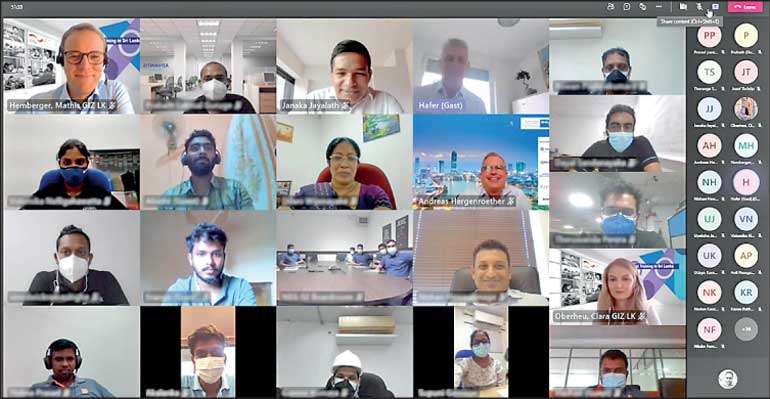Thursday Feb 19, 2026
Thursday Feb 19, 2026
Saturday, 7 August 2021 00:00 - - {{hitsCtrl.values.hits}}

In cooperation with Deutsche Gesellschaft für Internationale Zusammenarbeit (GIZ) GmbH Sri Lanka, the Delegation of German Industry and Commerce in Sri Lanka (AHK Sri Lanka) and the Tertiary and Vocational Education Commission (TVEC), leading logistic companies in Sri Lanka such as Aitken Spence, EFL Global, Hayleys Advantis, Hellmann MAS, John Keells joined the training initiative.
They will provide practical in-company training for 35 trainees to become officially according to German and Sri Lankan standards certified Warehouse Operators. A new German-certified cooperative vocational training for warehouse operators was officially launched by AHK Sri Lanka and GIZ Sri Lanka together with TVEC at an online kick-off event held on 2 August. Certified by AHK Sri Lanka and TVEC, the five logistics industry forerunners Aitken Spence Logistics, EFL Global, Hayleys Advantis, Hellmann MAS Supply Chains, and John Keells Logistics will provide on-the-job training for these trainees.
The training is part of the GIZ Vocational Training Program in Sri Lanka (VTSL), funded by the German Federal Ministry of Economic Cooperation and Development (BMZ). The VTSL program supports Sri Lankan public training institutes and private sector partners in strengthening industry-driven, demand-based cooperative training. This goes hand in hand with the dual training approach of AHK Sri Lanka, who is the implementation and certification partner for the project. In his opening statement Chief Delegate of German Industry and Commerce Andreas Hergenroether stated: “We are convinced that this industry and demand driven training will increase the competitiveness of the participating logistic companies. Germany has been ranked for many years at the top in the World Logistics Performing Index, there is a unique know-how in Germany with regards to dual training in logistics. In 2020 more than 67,000 dual training contracts have been concluded in the field of logistics.”
Representatives from the 5 Sri Lankan logistics companies confirmed the need for a qualified workforce to support the growth of the Sri Lankan logistics sector in their speeches and motivational words to the trainees.
During the online kick-off event, GIZ-Vocational Training Program Project Manager Mathis Hemberger said that GIZ works jointly with private and public partners with the aim to increase access to demand-based cooperative vocational training. “Most graduates are concerned that their in-class training does not necessarily meet the demands of the industry and their on-the-job training experience does not allow them to practice what they had learned. This mismatch has consequences on the employability of students who pass out of vocational training institutions but also for companies looking for qualified workers,” he added.
The Warehouse Operator Training will be certified by AHK Sri Lanka based on the German dual vocational qualification of Warehouse Operator (Fachlagerist) and is aligned with the National Competency Standard for ‘Logistics Operations’ (Storekeeper). Dual vocational training in Germany is supervised and certified by the Chambers of Commerce and Industry (IHK) and AHK Sri Lanka is the only organisation in Sri Lanka officially mandated by the Association of German Chambers of Industry and Commerce to certify dual vocational training abroad according to German IHK training standards. The dual approach aims for demand-oriented training by encouraging the active participation of private sector companies from the beginning of each training process as well as linking them closely with TVET institutions. AHK Sri Lanka and GIZ’s approach is suitable as there is a strong demand in the Sri Lankan logistics and warehouse sector for industry-driven practical vocational training. This was backed by a needs and stakeholder analysis which, among other results, found a 75% skills and knowledge gap for shopfloor workers and supervisors.
In Germany these skills gaps are prevented by an established system of dual vocational training, in which the industry cooperates with vocational schools and the 79 German Chambers of Commerce and Industry (IHK) to provide quality on-the-job training, alternating with theory classes.
The unique aspect of this project lies not only in its German certification but thereby also in the high percentage of practical in-company training and the way the theory will be conducted: Out of the overall duration of 12 months, 70% of the training will be conducted on-the-job in the warehouse by in-company trainers who are qualified by AHK Sri Lanka according to the ‘AdA International’, a Training of Trainer certification based on the German Regulation for Trainer Aptitude (AEVO). The 30% theory part will be provided by teachers from CINEC Institute via online lessons. The teachers are supported with training materials as well as with teacher training by GIZ Vocational Training Project.
Additionally, the companies are receiving assistance for in-company trainer training, training implementation and administrative tasks. This was supported by TVEC Deputy Director Janaka Jayalath, who added, “As the apex body for Technical, Vocational Education and Training (TVET) sector, TVEC identifies this Warehouse Operator training is important to logistics and supply chain management sector in Sri Lanka. Skilled human resources in this sector will open doors for potential investments in future and increased manufacturing operations in Sri Lanka.”
Therefore, successful trainees will receive a National Vocational Qualification Level 4 in ‘Logistics Operations (Storekeeper)’ by TVEC and the AHK Sri Lanka certificate ‘Local Dual Training according to German TVET System Elements’.
The kick-off event was concluded by management representatives from all 5 companies giving their motivational words to the trainees as well as emphasising on the importance of industry-driven training and well-qualified workforce to help the logistics sector to grow further.
As a next step, the possibility of developing further dual/cooperative training for ‘Logistics Operations Management’ and others is already in discussion.